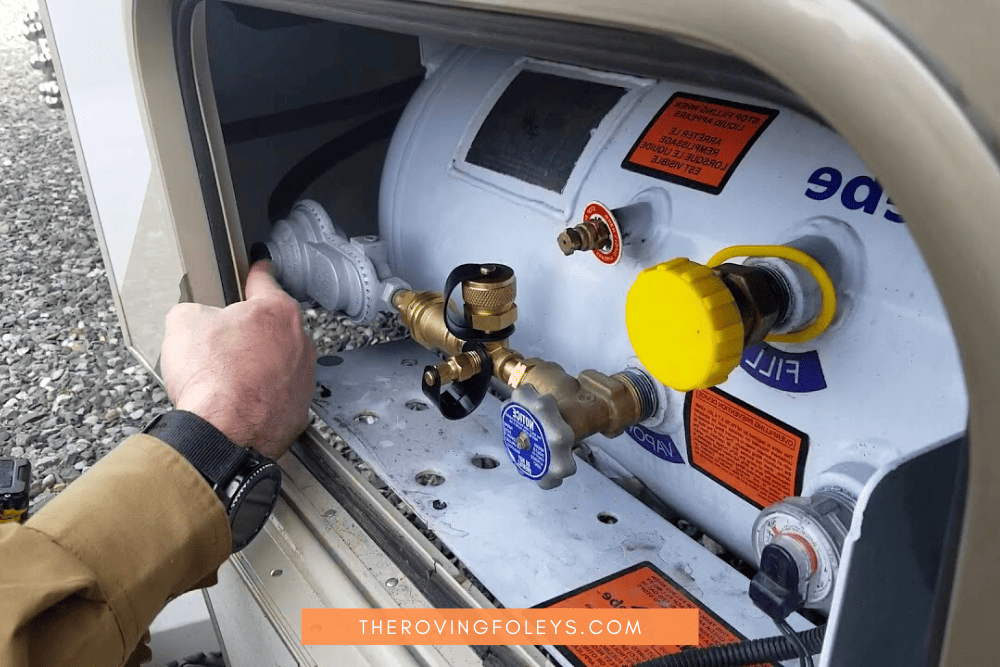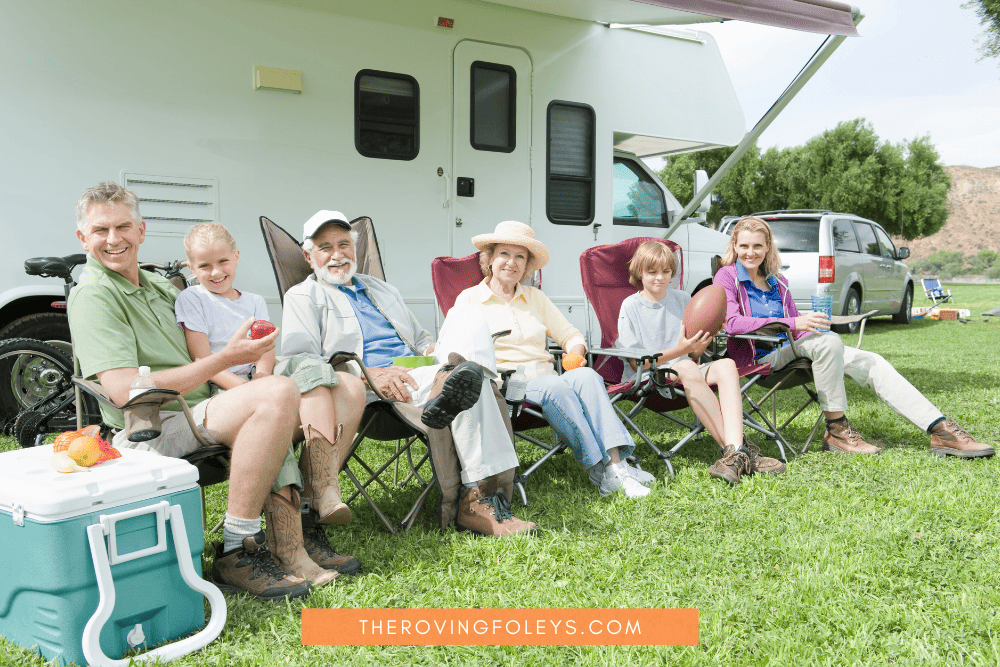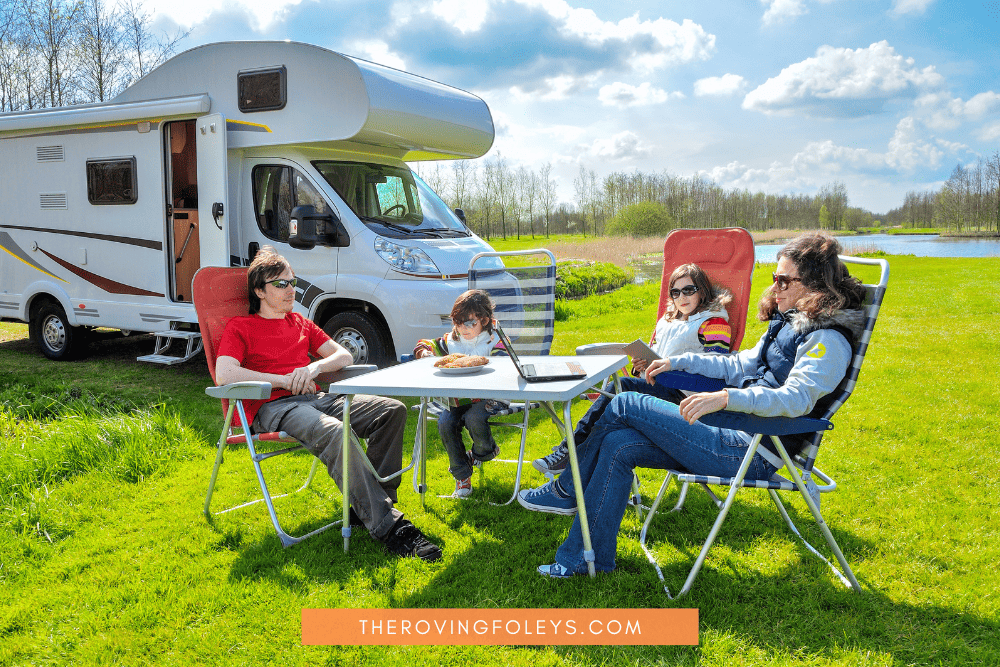Are you considering full-time RV living as a way to explore the open road and experience a sense of freedom like never before? If so, you’re probably wondering about the real cost of RVing in 2023. Don’t worry; we’ve got you covered! Let us guide you through the ins and outs of budgeting for your RV adventures, from campsite fees to entertainment and everything in between. We will also give you some ideas on how you can MAKE money while you travel.
Considering the Cost Of RVing:
As a full time RVer, you must consider the following costs as well as how to save money.
- Campsite fees
- Fuel and Propane
- RV Maintenance and Repairs
- RV and Health Insurance
- Food Expenses
- Entertainment and Recreation
- Internet and Phone
- Laundry, Mail, Storage, Clothing, Pets

Understanding the Costs of Full-Time RV Living
While the journey of full-time RV living may seem like a dream come true, understanding the RV living costs involved is crucial. From campsite fees to fuel costs, maintenance, insurance, and more, the expenses can add up quickly. However, with proper planning and budgeting, you can enjoy this adventurous lifestyle without breaking the bank.
Many factors can influence the cost of full-time RV living, including your preferences and travel style. It can vary greatly. Some people choose to stay at upscale RV resorts, while others prefer more budget-friendly options like state parks or boondocking on public lands. Your fuel costs will also be influenced by the type of RV or tow vehicle you have and how often you’re on the move. In addition, factors like entertainment, food, and health insurance will contribute to your overall monthly expenses.
We have broken down each aspect of RV living and provided money-saving and budgeting tips to help you navigate these costs. Let’s start with one of the most significant expenses: campsite fees.
Campsite Fees and How to Save Money
Depending on the type of campground and amenities offered, camping fees can vary from free to over $100 per night. On average, you can expect to pay between $25 and $60 per night for an RV park campsite, with higher fees for premium locations or full hookups. While these costs can add up quickly, there are several ways to save money on your lodging expenses.
First, consider taking advantage of free camping options like boondocking on public lands or dispersed camping in national forests. While you won’t have access to amenities like hookups or restrooms, you can save a considerable amount on campsite fees. Another option is to purchase campground memberships or passes, such as Thousand Trails Zone Passes or a National Parks Pass, which can offer discounted or even free stays at participating campgrounds.
You can also reduce costs by:
- Staying with friends or family
- Using apps like Campendium or The Dyrt to find discounted camping options
- Choosing state parks and budget-friendly RV parks
- Booking longer stays- weekly or monthly.
By mixing and matching these strategies, you can keep your campsite fees within your budget and still enjoy a variety of camping experiences.
Fuel Costs: Gas, Diesel, and Propane
When planning your RV adventures, you should also consider fuel costs as another significant expense. These costs include not only gas or diesel for your RV or tow vehicle but also propane costs for heating, cooking, and running appliances. Factors like the distance you travel, the type of vehicle you have, and fluctuating fuel prices can all impact your fuel expenses.
On average, motorhomes and trailer towing vehicles get around 10-12 miles per gallon, with larger RVs being less fuel-efficient. To help plan and manage your fuel costs, you can use tools like the RV Gas Cost Calculator to estimate your expenses based on your travel plans and current gas prices.
Driving at a consistent speed, properly inflating your tires, and minimizing unnecessary weight in your RV are all ways to save on fuel costs. Additionally, you can consider investing in solar panels to offset some of your propane or generator expenses for electricity.
RV Maintenance and Repairs: Budgeting and DIY Tips
To keep your home on wheels in top condition, it’s crucial to budget for RV maintenance and repairs. On average, you can expect to spend between $100 and $200 per month on general maintenance and upkeep, with the potential for higher costs if unexpected repairs arise. It’s important to factor in the RV living cost when planning your budget.

To save money on maintenance and repairs, consider learning some DIY repair skills and preventative measures. Here are some tasks you can perform to avoid costly repairs down the road:
- Inspect roof seams and window seals frequently
- Check tire pressures before and during every trip
- Keep your A/C filter clean
- Stay on top of oil changes
- Replace brakes when needed
By staying proactive and taking these measures, you can prolong the lifespan of your RV and save money in the long run.
Scheduling regular annual inspections at a service center is beneficial as it helps identify any necessary repairs and prioritize non-essential items that can be addressed according to your budget. This proactive approach can help you avoid larger, more expensive repairs in the future.
Insurance Considerations for Full-Time RVers
Insurance, an aspect of full-time RV living that cannot be overlooked, plays a critical role in ensuring a smooth RV life. It’s important to find a suitable policy that covers your RV and personal belongings, as well as liability protection in case of accidents or incidents. Factors such as your RV size, driving record, and state of residence can all impact your insurance rates.
When searching for RV insurance, start by contacting your current insurance agent to see if they can provide coverage for your RV lifestyle. Additionally, shop around and compare quotes from multiple insurance providers to ensure you’re getting the best rate and coverage for your needs. Some popular insurance companies for full-time RVers include Progressive and Good Sam RV Insurance.
Be absolutely sure that your RV insurance will cover you in other states if you are traveling far.
Keep in mind that insurance costs can vary depending on the level of coverage you require and any additional riders or endorsements you choose to add to your policy. Thoroughly reviewing your options and choosing the coverage that best suits your needs and budget is of utmost importance.

Managing Food Expenses on the Road
If you enjoy dining out at local restaurants or purchasing specialty food items, food expenses can make up a significant portion of your RV living budget. Managing your food expenses on the road involves balancing dining out with cooking in your RV, as well as considering factors like your destination and food preferences.
To save money on food, consider buying groceries in bulk and preparing meals in your RV. This not only allows you to control your food costs but also enables you to enjoy home-cooked meals while on the road. Additionally, when visiting remote tourist destinations, plan to stock up on groceries before arriving, as prices may be higher in small towns and local stores.
If your RV has a residential refrigerator (like ours) you can hit a Walmart or Sam’s Club/ Costco on your way to your destination and pack up the rig for a long stay. This will save TONS on local grocery costs.
Setting a monthly food budget and keeping track of your spending is crucial to ensure you stay within your limits. This will help you make informed decisions about dining out and grocery shopping, allowing you to enjoy your culinary experiences without breaking the bank.
Entertainment and Recreation Costs
Depending on your interests and travel style, entertainment and recreation costs can fluctuate significantly. Some examples of entertainment and recreation expenses include:
- Visiting national parks
- Attending concerts or live performances
- Trying out new activities or sports
- Going on guided tours or excursions
- Visiting museums or cultural attractions

These expenses can add up quickly, but with careful planning and budgeting, you can enjoy a wide range of experiences without overspending.
Consider allocating a monthly budget for fun experiences to manage your entertainment and recreation costs. This will help you balance paid activities with free ones, ensuring you have enough funds for the experiences that matter most to you. For example, you might allocate a portion of your budget for paid attractions like museums or amusement parks, while reserving the rest for free or low-cost activities like hiking or beach days.
In addition, you can save money on entertainment by utilizing resources like the America the Beautiful pass, which grants access to national parks and other federal lands for a yearly fee. By taking advantage of discounts, memberships, and passes, you can make the most of your entertainment budget and create lasting memories on your RV journey.
There are also large scale passes for Museums and Science Centers all over the country as well as Zoos and Aquariums!
Staying Connected: Internet and Phone Options for RVers
For many people, especially those who work remotely or rely on internet for entertainment and communication, staying connected while RVing is of paramount importance. Reliable internet and phone options are crucial for maintaining this connection, and there are several options available to suit your needs and budget.
Mobile hotspots can provide internet access on the go, with service providers like AT&T and Verizon offering unlimited data plans for a monthly fee. In addition, some RVers opt for satellite internet connections, which can provide more reliable coverage in remote areas but may come with higher upfront costs and slower speeds.
From time to time you can find internet service resellers on Ebay which may give you a good monthly deal on service.
For phone service, consider a plan with nationwide coverage and unlimited talk and text to stay connected without worrying about overage fees. Additionally, many RV parks and campgrounds offer free Wi-Fi, which can help offset your internet and phone expenses while on the road.

Navigating Health Insurance for Full-Time RVers
For full-time RVers, health insurance is a key consideration, given that medical expenses can rapidly turn into a significant financial burden without sufficient coverage. Navigating the health insurance landscape can be challenging, especially as a full-time RVer who may have unique needs and circumstances.
One option for obtaining health insurance is through remote work opportunities or freelance gigs that offer coverage as part of their benefits package. Additionally, you can explore individual plans through the Health Insurance Marketplace or private insurers to find a policy that meets your needs and budget.
When comparing health insurance options, consider the following factors:
- Coverage levels
- Deductibles
- Co-payments
- Network providers
Choosing a plan that offers adequate coverage and fits within your monthly budget is crucial, providing peace of mind as you travel and explore your new RV lifestyle.
Miscellaneous RV Expenses to Consider
Beyond the primary expense categories discussed above, other miscellaneous costs need consideration when budgeting for full-time RV living. These include:

- Laundry
- Mail forwarding
- Storage
- Clothing
- Personal care
- Pet expenses
- Other variable costs that may arise while on the road
Laundry costs can vary depending on the facilities available at your campground or RV park, as well as how often you choose to do laundry. Mail forwarding services can help you maintain a permanent address and receive important mail while traveling, with fees varying depending on the service and level of features required.
Other miscellaneous expenses like clothing, personal care, and pet expenses will depend on your individual needs and preferences. Accounting for these monthly costs in your budget and keeping track of your spending is vital to ensure you stay within your limits.
Saving Money with Campground Memberships, Passes, and Apps
You can save money on your RV living expenses and free up funds for other costs and experiences by using campground memberships, passes, and apps. Campground memberships like Thousand Trails, Boondockers Welcome, and Escapees/Xscapers offer discounted or free stays at participating campgrounds, helping you reduce your lodging expenses.
Additionally, passes like the America the Beautiful pass provide access to national parks and other federal lands for a yearly fee, allowing you to explore these beautiful destinations without breaking the bank. Camping apps like Campendium and The Dyrt can also help you find discounted camping options and user reviews, making it easier to plan your stays and manage your budget.
By taking advantage of these resources, you can save money on your campground fees and make the most of your full-time RV living experience.
Creating a Monthly Budget for Full-Time RV Living
Formulating a monthly budget is crucial for effectively managing your expenses and income in full-time RV living. A well-planned budget will help you differentiate between fixed costs, such as insurance and RV payments, and variable costs like fuel, food, and entertainment.

As a general rule, figure around the same amounts for eating out and entertainment as you did before going on the road. This allows you to allocate your funds appropriately and ensure you’re staying within your means.
To create a monthly budget, follow these steps:
- List all your fixed expenses (e.g. rent, utilities) and variable expenses (e.g. groceries, entertainment).
- Include any income sources (e.g. salary, freelance work).
- Track your spending on a daily or weekly basis to ensure you’re staying within your budget.
- Make adjustments as needed to align your spending with your budget.
- This will give you a clear understanding of your financial situation and help you make informed decisions about your RV lifestyle.
Don’t be afraid to revisit and adjust your rv budget as your circumstances and priorities change. Full-time RV living is an ever-evolving experience, and your budget should reflect this flexibility and adaptability.
Earning Income While Living in an RV
Generating income while living in an RV can offer financial stability, allowing you to enjoy your RV lifestyle without constant worry about expenses. There are numerous remote work opportunities available that can be well-suited for full-time RVers, allowing you to earn a living while exploring the open road.
Freelance writing and photography are popular options for RVers, as these skills can be utilized in various industries and settings. Some ways to earn income while living in an RV include:
- Art/Craft
- Traveling Musician
- Blogging
- Submitting stories to outdoor magazines and websites
- Selling photos online
- Campground hosting
- Virtual assistance
- Travel nursing
- RV repair and maintenance
- Tutoring/ Road Schooling

These options allow you to earn income while enjoying the freedom and flexibility of RV living.
By exploring these remote work opportunities and finding a suitable job that aligns with your skills and interests, you can maintain financial stability and fully embrace the full-time RV lifestyle.
Summary
Embracing the full-time RV lifestyle in 2023 can be an exciting and rewarding experience, offering unparalleled freedom and adventure. While the costs associated with RV living can vary greatly, proper planning, budgeting, and resourcefulness can help you manage your expenses and enjoy this unique lifestyle without breaking the bank. By understanding the different aspects of RV living costs, utilizing resources like campground memberships and passes, and earning income through remote work opportunities, you can confidently embark on your RV journey and create lasting memories on the open road.
RELATED ARTICLES:
Frequently Asked Questions
What is the average cost of full time RVing?
On average, full-time RVing costs around $2,500- $3,000 a month. This includes only the RV-specific expenses and not any additional personal costs.
How expensive is it to travel in an RV?
It appears that full-time RV living costs range from $1,600 to $5,000 per month while vacationing and renting a small RV costs around $55 per day and $0.18/mile based on fuel consumption.

Is it financially smart to live in an RV?
RV living has the potential to be financially smart due to lower costs for heating, cooling, and maintenance, as well as a simpler lifestyle that reduces expenses on possessions.
What are some ways to save money on campsite fees?
Save money on campsite fees by boondocking, getting a campground membership or pass, and using apps to find discounts.
How can I earn income while living in an RV?
You can easily earn income while living in an RV by taking advantage of the various remote work opportunities, such as freelance writing, photography, campground hosting, virtual assistance, and travel nursing.

Frank Foley
Frank is the Head Hubby, Daddy, and Fix-It Guy of the Roving Foleys clan. He ia an avid traveler and has spent over 5 years traveling full time with his family. he loves helping others learn about the RV life. He has also traveled in Europe, Asia, and Australia with his wife Grainne.

